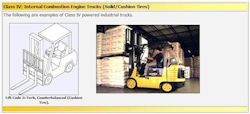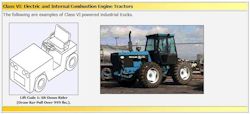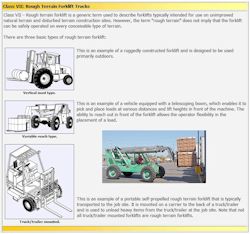Class IV Internal Combustion Engine Trucks (Solid/Cushion Tires)
These forklifts are used primarily inside on smooth dry floors.
They typically load, transfer, and unload palletized loads in manufacturing plant/warehouse loading docks and storage areas. The cushion-tired forklifts are lower to the ground than pneumatic-tired forklifts, which is more useful in low clearance areas.
Class V Internal Combustion Engine Trucks (Pneumatic Tires)
Class V Forklifts are the most common type of forklifts for inside or outside use in warehouses and other areas.
They are powered by internal combustion engines and are available for use with LPG, Gasoline, Diesel, and Compressed Natural Gas fuel systems.
Class VI Electric and Internal Combustion Engine Tractors
These forklifts are versatile and can be used in various areas.
They are equipped with either internal combustion engines for outdoor areas of use or battery powered electric motors for indoor use.
Class VII Rough Terrain Forklift Trucks
These forklifts have large flotation type tires for outdoor use on uneven and rough surfaces. They are most often used at construction sites to transport and lift materials to various locations and levels on the worksite. You will also see these forklifts in lumber yards and auto recycler facilities.
Workers driving rough terrain forklifts must perform work on sloped and possibly unstable surfaces. Dips, holes, excavations and overhead powerlines can also make operating rough terrain forklifts hazardous. Workers must be extra cautious due to the type of work being performed so that they do not experience rollovers, tipovers and collisions.
For more information on the various types of forklifts see OSHA's Powered Industrial Trucks (Forklift) » Types & Fundamentals.
Knowledge Check Choose the best answer for the question.
1-3. Which of the following forklift classes are most often used at construction sites to transport and lift materials to various locations and levels on the worksite?
You forgot to answer the question!




